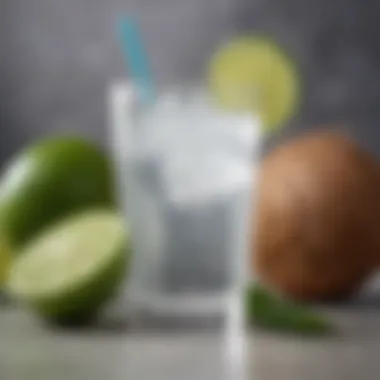Optimal Beverages for Efficient Electrolyte Replacement


Intro
Electrolytes are vital for numerous body functions, including muscle contraction and nerve signaling. They are minerals that carry an electric charge, helping to maintain hydration, acid-base balance, and overall bodily functions. Yet, we often overlook the importance of replacing these essential nutrients after exercise, illness, or simply through daily activities. This article aims to provide a comprehensive look into effective drinks that replace electrolytes. By understanding your hydration needs, you can make informed choices that cater to your lifestyle.
Recipe Overview
Brief Summary of the Recipe
This section will guide you through various beverage options that efficiently replenish electrolytes. From sports drinks to natural sources, we will explore what's available for quick and effective hydration.
Key Ingredients and Tools Needed
When choosing drinks to replenish electrolytes, focus on the following key ingredients:
- Sodium: Found in table salt and sea salt
- Potassium: Present in bananas, coconut water, and oranges
- Calcium: Available in dairy products or fortified plant-based alternatives
- Magnesium: Often found in nuts, seeds, and whole grains
You don’t need specific tools, but having a blender can be useful for making smoothies or electrolyte-rich beverages at home.
Step-by-Step Instructions
Detailed Making Steps
Here are several popular drinks along with their preparation steps:
1. Homemade Electrolyte Drink
- Ingredients: 1-liter water, 1/4 tsp sea salt, juice of 1 lemon, 2 tbsp honey (optional)
- Steps:
- Boil water and allow it to cool.
- In a pitcher, combine the cooled water with sea salt and lemon juice.
- Stir until the salt dissolves completely.
- Add honey if a sweet flavor is desired.
- Chill in the refrigerator before serving.
2. Coconut Water
- This is naturally high in potassium and ideal for replenishing lost fluids after exercise.
3. Electrolyte Tablets
- Dissolve tablet in water according to packaging instructions for an easy and quick hydration boost.
Tips for Successful Execution
- Balance flavors: Adjust the sweetness or acidity to your preference.
- Chill: Consuming cold beverages can enhance hydration, especially after physical activity.
- Stay informed: Read labels if buying pre-made beverages to check for sugar content and additional ingredients.
Replacing lost electrolytes is crucial for maintaining optimal hydration and overall health. Consider your activity levels when debating which drinks to consume.
Finale
Understanding your body's needs, especially after sweating or illness, will guide you in finding the right drinks for electrolyte replacement. Whether you opt for store-bought drinks or create your own at home, ensure that you are effectively and efficiently replenishing important minerals.
Understanding Electrolytes
Electrolytes, although often overlooked, play a critical role in our bodily functions. Understanding them lays the groundwork for grasping their importance in maintaining health. Electrolytes help facilitate vital processes, such as regulating nerve function, muscle contraction, and hydration status. In this section, we will explore the components of electrolytes, their functions within the body, and potential causes for imbalances that can lead to serious health issues.
What Are Electrolytes?
Electrolytes are minerals that carry an electric charge when dissolved in fluid. They include sodium, potassium, calcium, magnesium, chloride, bicarbonate, and phosphate. These minerals are prevalent in various foods and drinks, contributing to essential bodily functions. For example, sodium primarily aids in regulating fluid balance, while potassium is crucial for muscle function and nerve transmission.
Maintaining proper levels of these electrolytes is vital for keeping the body's internal environment stable, which is known as homeostasis. Various conditions, activities, and dietary patterns can affect the levels of these minerals in the body.
Functions of Electrolytes in the Body


Electrolytes serve numerous essential functions. Here are some key roles they play:
- Fluid Balance: They help keep the right balance of fluids inside and outside of cells. This balance is necessary for functions like digestion and circulation.
- Muscle Function: Electrolytes are critical in muscle contraction and relaxation, particularly potassium and calcium. An imbalance can lead to muscle cramps or weakness.
- Nerve Impulses: These minerals transmit electrical signals throughout the body. Proper communication between nerve cells relies on the right levels of electrolytes.
- Acid-Base Balance: Electrolytes help regulate the body's pH levels, ensuring a healthy internal environment.
Causes of Electrolyte Imbalance
Electrolyte imbalances can stem from various factors. Identifying these causes can help in prevention and treatment. Some common causes include:
- Dehydration: This often occurs due to excessive sweating, vomiting, or diarrhea, leading to a drop in electrolyte levels.
- Poor Diet: A diet lacking essential nutrients is a common factor for imbalances. Foods rich in electrolytes, like fruits and vegetables, are vital for maintaining health.
- Medications: Certain medications, like diuretics, can affect electrolyte levels. They may lead to increased urination, which can cause a depletion of important minerals.
- Medical Conditions: Conditions such as kidney disease can hinder the body’s ability to balance electrolytes effectively.
The Importance of Hydration
Hydration is a fundamental aspect of maintaining bodily functions and overall health. Our bodies are comprised of about 60% water, highlighting its significance in every physiological process. When we think about replacing electrolytes, we must first understand the crucial role hydration plays in this balance.
Staying adequately hydrated ensures that electrolytes, such as sodium, potassium, and magnesium, are effectively transported throughout the body. Dehydration not only impairs the balance of these critical elements but also hinders various bodily functions. Thus, understanding the importance of hydration in electrolyte replacement goes beyond thirst; it's about maintaining optimal health and performance.
In this section, we will explore how hydration directly influences electrolyte levels and identify symptoms that indicate dehydration and imbalances.
How Hydration Affects Electrolyte Levels
Hydration significantly impacts electrolyte levels in the body. When we consume liquids, they help dissolve electrolytes, making it easier for our cells to absorb and utilize them properly.
- Fluid Balance: Proper hydration maintains the fluid balance, which is essential for electrolyte transport. When we lose fluids through sweat, urine, or vomiting, we also lose electrolytes, which can lead to an imbalance.
- Muscle Function: Adequate hydration supports muscle function. Electrolytes conduct electrical impulses in muscles. Lack of water can interrupt this function, causing cramping or spasms.
- Blood Volume Regulation: Hydration helps maintain blood volume. Proper blood volume is essential for effective circulation and nutrient delivery throughout the body.
Ensuring sufficient water intake contributes to optimal electrolyte balance, thus supporting overall health.
Symptoms of Dehydration and Imbalance
Dehydration can manifest in various symptoms, signaling that the body lacks sufficient fluids. Here are common indicators:
- Thirst: An obvious sign that the body requires more fluids.
- Dry Mouth: Reduced saliva production often accompanies dehydration, causing discomfort.
- Fatigue: Low energy levels can occur when hydration status is inadequate.
- Headaches: Dehydration can lead to headaches or migraines due to the brain temporarily contracting.
- Muscle Cramps: These may occur from low levels of electrolytes, exacerbated by dehydration.
- Dizziness or Lightheadedness: A significant dip in fluid levels can affect blood pressure, causing such symptoms.
Maintaining hydration is essential for avoiding these symptoms and ensuring that electrolyte levels remain stable and functional.
Overall, understanding the link between hydration and electrolyte levels is critical for anyone looking to maintain peak health and performance. Proper hydration enables the body to process and utilize electrolytes efficiently, thus preventing the developmental symptoms of dehydration.
Beverage Options for Electrolyte Replacement
Selecting the right beverages to replace electrolytes is imperative for overall health. Electrolytes play a crucial role in maintaining hydration, supporting nerve function, and balancing bodily fluids. When the body loses electrolytes through sweat, urine, or other means, it becomes vital to replenish them promptly to prevent imbalances that might lead to fatigue, muscle cramps, or severe complications.
The variety of liquid options available can cater to different preferences and lifestyles. This segment will explore commonly recommended drinks, emphasizing their unique benefits and considerations, ensuring you can make an informed choice based on your needs.
Electrolyte-Rich Sports Drinks
Electrolyte-rich sports drinks have gained prominence among athletes and active individuals. These beverages are formulated specifically to replace electrolytes lost during intense physical activity. Brands like Gatorade and Powerade include essential electrolytes such as sodium, potassium, and magnesium, providing quick rehydration.
The appeal lies in instant replenishment during or after exercise. However, potential downsides include high sugar content, which can contribute to energy spikes and crashes. For someone aiming to sustain energy without unnecessary sugar, opting for low-sugar sports drink alternatives might be a better fit. Always be mindful of the serving size and ingredient list.
Coconut Water as an Alternative
Coconut water is often dubbed nature’s sports drink. It is a natural source of electrolytes, particularly potassium, making it an excellent alternative to commercial sports beverages. The flavor is mild and refreshing, appealing to those who prefer a less sweet option.
Unlike most sports drinks, coconut water contains significantly lower sugar levels and fewer calories, making it suitable for daily hydration, not just post-workout. However, it is essential to choose 100% coconut water, as many commercial versions might contain added sugars or flavors.
Electrolyte Infused Water
Infused waters have surged in popularity, offering a simple way to enhance hydration. These drinks combine water with electrolytes such as calcium, magnesium, and potassium, typically without excess calories or sugars. Brands like Propel and Smartwater form a notable category here.
Infused water allows for the convenience of hydration while ensuring a balanced electrolyte intake. They can be particularly appealing to those who find plain water uninspiring. While these beverages are beneficial, it is important to read labels too, as not all are created equal.


Natural Juices and Their Benefits
Natural fruit juices can also aid in electrolyte replacement. Juice from fruits such as orange or watermelon provides a natural source of potassium and other nutrients.
Opting for 100% juice, devoid of additional sugars, maximizes the health benefits. However, moderation is essential due to natural sugars that can spike blood sugar levels. Diluting the juice with water or opting for a half juice, half water mix can provide hydration without overwhelming sweetness.
Herbal Teas for Electrolyte Support
Herbal teas might not be the first choice for electrolyte replenishment; however, they offer an indirect support role. Certain herbs, such as hibiscus or nettle, come packed with essential minerals. Furthermore, herbal teas aid hydration in a fulfilling way.
When consumed warm or cold, herbal teas can serve as an enjoyable drink to maintain fluid intake throughout the day. Remember to avoid any herbal combinations with diuretic effects, as they may lead to further electrolyte loss.
It is crucial to recognize individual needs when selecting the right drinks for electrolyte replenishment. Personal preferences and lifestyle choices should guide decisions toward effective hydration.
Homemade Electrolyte Drinks
Homemade electrolyte drinks are a practical solution for those looking to replenish lost electrolytes without relying on commercial beverages. These drinks can be tailored to individual needs, preferences, and dietary restrictions. Making your own drinks allows for greater control over the ingredients, ensuring the absence of artificial additives, excessive sugars, or unwanted preservatives.
Using natural ingredients offers several benefits. First, homemade drinks can be cost-effective compared to store-bought options. Additionally, they allow you to adjust flavors and components based on personal tastes. This flexibility can encourage increased consumption, particularly during periods of dehydration from exercise or heat.
Furthermore, the process of making these drinks can be quite simple and fulfilling. Individuals can engage with food and nutrition more meaningfully. Overall, homemade electrolyte drinks present a healthy and enjoyable way to stay hydrated.
Recipe: Simple Homemade Electrolyte Drink
Creating a simple homemade electrolyte drink often requires only a few ingredients. Here is a basic recipe you can follow:
Ingredients:
- 1 liter of water
- 1/2 teaspoon of salt (preferably sea salt or Himalayan salt)
- 1/2 teaspoon of baking soda
- 1/4 cup of fresh lemon or lime juice
- 2 tablespoons of honey or maple syrup (optional for sweetness)
Instructions:
- Combine all ingredients in a large pitcher.
- Stir well until the salt and honey (if used) are dissolved completely.
- Taste the mixture and adjust sweetness or acidity to your preference.
- Chill in the refrigerator before serving or enjoy immediately over ice.
This drink balances sodium, bicarbonate, and hydration, making it useful post-exercise or during hot weather.
Customizing Your Own Electrolyte Solution
One of the key advantages of homemade electrolyte drinks is the ability to customize recipes. Consider the following elements to enhance or tailor your drink:
- Fruits: Adding various fruits not only heightens flavor but also provides additional vitamins. For instance, adding a splash of orange juice can boost vitamin C content.
- Herbs: Fresh mint or basil can impart a refreshing taste and potential health benefits.
- Flavor Enhancers: You can experiment with spices like ginger, which might aid digestion and give a unique kick.
- Sweeteners: Adjust sweetness based on your dietary goals. Natural sweeteners like agave syrup or stevia can replace traditional sugars.
Remember to check your electrolyte balance. Adjust ingredients according to your activity level and personal needs. Staying drhydrated is essential, and customizing your drinks can be a critical component of that effort.
Considerations Based on Activity Level
Understanding your activity level is crucial when it comes to electrolyte replacement. Different activities have varying demands on the body, impacting both hydration needs and electrolyte balance. For athletes and individuals engaging in strenuous exercise, the loss of electrolytes occurs at a much faster rate due to sweat loss. Therefore, it is essential to consider the type, intensity, and duration of physical activities when selecting beverages for electrolyte replenishment.
Hydration and electrolyte balance are closely linked to your physical activities, which in turn, dictate the type of fluids you should consume.
Electrolyte Needs for Athletes
Athletes have unique hydration needs compared to more sedentary individuals. During high-intensity workouts, the body expels significant amounts of sodium, potassium, calcium, and magnesium through sweat. Therefore, athletes must focus on replacing these electrolytes swiftly to maintain peak performance and avoid cramps and fatigue.
Some effective beverage options for athletes include
- Commercial sports drinks: These often contain a balanced mixture of electrolytes and carbohydrates to fuel energy levels. Look for options low in sugar but rich in electrolytes like Gatorade and Powerade.
- Coconut water: Known for its natural electrolyte content, coconut water is a good, low-calorie alternative to sports drinks. It contains potassium and sodium, which can aid in recovery post-exercise.
- Homemade electrolyte drinks: Creating a mix of water, salt, and a squeeze of lemon or lime can also be beneficial. This allows greater control over sugar and sodium inputs.
Athletes should also consider timing their electrolyte intake carefully. Consuming the chosen drink before, during, and after workouts can promote better hydration and energy recovery.


Balanced Hydration for Everyday Activities
For those who lead a regular, less active lifestyle, electrolyte needs differ significantly. Common activities like walking, light jogging, or moderate household chores do not result in substantial electrolyte loss. However, even in these cases, a basic understanding of hydration is essential.
Daily hydration can be effectively maintained by:
- Drinking water adequately: For most people, plain water is sufficient, but mild summer heat or mild exertion may require additional electrolyte sources.
- Incorporating electrolyte-rich foods: Foods such as bananas, spinach, yogurt, and nuts can support daily electrolyte needs without needing to rely heavily on drinks.
- Consuming herbal teas: Herbal teas can provide hydration with minimal or no calories and can contain beneficial compounds that further support health.
Overall, for everyday activities, while balancing hydration, it’s important to listen to your body. Signs like fatigue, headaches, or muscle cramps may indicate a need for electrolyte attention, signaling that introducing an electrolyte infusion could be helpful.
Cautions and Considerations
When exploring options for electrolyte replenishment, it is crucial to approach the subject with caution. While staying hydrated and replacing lost electrolytes is vital for overall health, taking care to avoid excessive intake is equally important. The focus here will be on how to recognize the signs of overconsumption and why consulting experts can offer necessary guidance in maintaining a balanced approach.
Identifying Excessive Electrolyte Consumption
Excessive electrolyte consumption can lead to serious health issues. Understanding the signs and causes of overconsumption can prevent potential complications. Symptoms can vary, but they often include nausea, muscle weakness, confusion, and even heart irregularities. Some common situations leading to high intake involve the consumption of sports drinks or supplements containing elevated levels of sodium, potassium, or magnesium without proper need.
To recognize excessive consumption, consider the following:
- Monitor Symptoms: Pay attention to how your body feels after consuming electrolyte drinks. Nausea and muscle cramps may indicate too much.
- Knowledge of Recommended Intake: Familiarize yourself with recommended daily allowances for various electrolytes. For example, the suggested daily intake for sodium is around 2,300 mg for most adults.
- Consult Labels: Always read the nutrition labels on products. Sometimes drinks may contain more electrolytes than your body needs, particularly in sugary sports drinks.
It's essential to balance intake with physical activity levels. Not all individuals require high levels of replenishment.
Consulting with Healthcare Professionals
Engaging healthcare professionals for guidance on electrolyte intake can provide personalized advice tailored to individual health needs. This is particularly important for people with existing health conditions, such as kidney issues or heart disease, where electrolyte balance is critical.
Healthcare providers can offer insights on:
- Personal Health Assessments: Assessing individual health status helps determine appropriate electrolyte levels.
- Tailored Recommendations: Professional advice can come in the form of dietary adjustments, supplements, or specific drink recommendations.
- Evaluating Underlying Symptoms: Sometimes, symptoms of imbalance might not directly relate to hydration or electrolyte intake. Medical help can determine the cause effectively.
Consultation can also be critical when embarking on new exercise regimens that may alter hydration needs significantly. Overall, professional input ensures a balanced approach to electrolyte management, safeguarding one's health.
Incorporating these cautions and considerations into daily practice can help in making smart choices about hydration and electrolyte replacement.
The Role of Diet in Maintaining Electrolyte Balance
Maintaining an optimal balance of electrolytes is essential for overall health. While beverages play a crucial role in electrolyte replenishment, the diet is equally significant. Inadequate consumption of certain food groups can lead to deficiency, while excessive intake may cause imbalance. Thus, understanding how diet influences electrolyte levels can help individuals make informed food choices that support their hydration and health needs.
A balanced diet rich in electrolyte-containing foods can contribute greatly to maintaining physiological function. Key electrolytes include sodium, potassium, calcium, magnesium, chloride, bicarbonate, and phosphate. These minerals work synergistically in various bodily processes, including fluid regulation, muscle contractions, and nerve impulses. Therefore, prioritizing foods rich in these electrolytes can provide a substantial boost to one’s health.
People should consider several factors when looking at diet for electrolyte balance. First, not everyone has the same needs. For instance, athletes or those engaged in intense physical activity require more electrolytes compared to sedentary individuals. Thus, one's level of activity should dictate dietary choices. Additionally, specific dietary fads or trends may impact how individuals manage their electrolyte intake, necessitating a strategic approach to eating.
"Electrolytes help to conduct electrical impulses in the body, vital for muscle movement and nerve function."
Combining knowledge of electrolytes with dietary choices leads to a holistic view of health. Incorporating a variety of food sources guarantees a wider range of minerals, which can lead to better health outcomes.
Foods Rich in Key Electrolytes
To maintain an appropriate electrolyte balance, the following foods should be an integral part of your diet:
- Bananas: Known for high potassium content, they are ideal for preventing muscle cramps and replenishing minerals lost during exertion.
- Spinach: This leafy green contains both potassium and magnesium. It can be consumed raw in salads or cooked to suit various dishes.
- Greek Yogurt: Rich in calcium, it also supports digestion through probiotics, making it a beneficial snack or meal addition.
- Nuts: Almonds and cashews are excellent sources of magnesium, crucial for muscle function and heart health.
- Oranges: High in potassium and vitamin C, this fruit can be a refreshing way to boost electrolyte levels.
- Chia Seeds: These tiny seeds are packed with calcium, magnesium, and potassium, making them versatile for smoothies or oatmeal.
- Avocado: Besides being a source of healthy fats, avocados are rich in potassium, aiding in fluid balance within the body.
Incorporating these foods into your daily meals will help ensure you receive adequate electrolytes to support overall health and well-being. Being mindful of your dietary choices plays a significant role in maintaining electrolyte balance.
Finale
In this article, we have explored the critical role that electrolytes play in maintaining health, hydration, and overall bodily function. The importance of hydrating properly cannot be overstated, especially in today’s fast-paced lifestyle. Understanding what we drink can enhance our body's electrolyte balance and support daily activities.
Replacing electrolytes is not just a concern for athletes or those engaging in intense physical activity; it is essential for everyone. Ensuring adequate intake of electrolyte-rich drinks helps prevent dehydration and maintains optimal physiological functions. Health implications arising from imbalances can manifest in numerous ways, reflecting the crucial balance needed in our diet and beverage choices.
Moreover, the variety of beverage options discussed, from sports drinks to natural juices, serves as a reminder that we can select drinks based on our specific needs. Personal preferences, dietary restrictions, and lifestyle factors all influence our choices. For instance, while electrolyte-infused waters may suit some, others might find coconut water or homemade solutions more appealing. Understanding these choices allows individuals to tailor their hydration strategy effectively.
It is equally important to remember the risks of excessive consumption of certain beverages. Consulting with healthcare professionals when uncertain about dietary choices can guide us toward healthier alternatives. A balanced intake of electrolytes supports not only physical performance but also cognitive functions and mood stability.
Therefore, thoughtful consideration of our beverage intake, aligned with a balanced diet, can ensure we meet our body’s needs. By being informed of these elements, we empower ourselves to make better hydration choices, ultimately promoting well-being and vitality in our lives.







